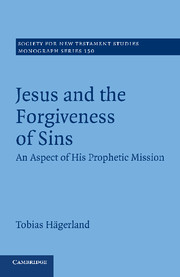Book contents
- Frontmatter
- Contents
- Tables
- Acknowledgements
- Abbreviations
- 1 Introduction
- 2 Forgiveness in the gospel tradition
- 3 Forgiveness and primitive Christian theology
- 4 Mediators of forgiveness in early Judaism
- 5 Forgiveness in the mission of the historical Jesus
- 6 Forgiveness from Jesus to the Gospels
- 7 Conclusion
- Bibliography
- Index of passages
- Index of modern authors
- Index of topics
2 - Forgiveness in the gospel tradition
Published online by Cambridge University Press: 05 December 2011
- Frontmatter
- Contents
- Tables
- Acknowledgements
- Abbreviations
- 1 Introduction
- 2 Forgiveness in the gospel tradition
- 3 Forgiveness and primitive Christian theology
- 4 Mediators of forgiveness in early Judaism
- 5 Forgiveness in the mission of the historical Jesus
- 6 Forgiveness from Jesus to the Gospels
- 7 Conclusion
- Bibliography
- Index of passages
- Index of modern authors
- Index of topics
Summary
The investigation will begin by setting out the primary evidence from the Gospels, and by identifying and excluding from further consideration any elements that stem from the evangelists’ redactional activity, the word ‘redaction’ being used here in a sense that is more metaphorical than literal, that is, as a means of visualizing in literacy-focused terms quite complex processes and phenomena, which often operate according to principles of orality. In this way, I hope to be able to clarify to what extent the notion of the earthly Jesus as someone who forgave sins is multiply attested in the tradition.
The concern will be with those texts which, directly as in Mark 2.1–12 par., or indirectly as in John 20.19–23, attribute or may attribute a forgiving activity to the earthly Jesus. ‘Forgiving activity’ is a deliberately vague expression, which draws attention to an important aspect of the criterion of multiple attestation that was mentioned in Chapter 1: what, exactly, are we expecting to find attested? If it is a general attitude of forgiveness in Jesus’ mission, or an emphasis on the theme in his preaching, then ‘forgiving activity’ can be taken in a broad sense to include not only every mention of forgiveness in the sayings of Jesus, but also his table-fellowship with sinners, his parables and so on. If, on the other hand, our interest lies in determining the plausibility of Jesus claiming for himself an authority to forgive sins, then the criterion of multiple attestation is met only if multiple sources agree that Jesus did lay claim to such an authority. What is general cannot count as attestation for what is specific.
- Type
- Chapter
- Information
- Jesus and the Forgiveness of SinsAn Aspect of his Prophetic Mission, pp. 37 - 84Publisher: Cambridge University PressPrint publication year: 2011

